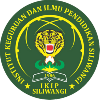BOOSTING THE ENGLISH VOCABULARIES THROUGH “CUBLAK- CUBLAK SUWENG” FOR YOUNG LEARNERS IN HYBRID CLASSROOM
Abstract
The digital era brings young learners play technology based online games more than the traditional games. Whereas, they contain many individual and passive elements. The purposes of this research were to know the implementation of “Cublak-cublak Suweng” as modified traditional game in increasing the English vocabularies of young learners in hybrid classroom. The second, to know the students’ perception in playing Cublak-cublak Suweng in their classroom. The research used descriptive qualitative method with purposive sampling. Thirty elementary school students participated in the research. The research used tests, interviews, observation, and documentations for data collection techniques. The result showed that “Cublak-cublak Suweng” as modified traditional game gave a positive impacts on learning and boosting students’ vocabularies of English. It was seen from 72% of students having a ‘very good and excellent” level. In the score range of 80-90. Second, the perception of students stated that “Cublak-cublak Suweng” is effective learning strategy in English vocabularies classroom. So, “Cublak-cublak Suweng” is effective to use in boosting the English vocabularies of young learners in hybrid classroom.
References
Azizah, N., Muhtarom, M., & Sumarno, S. (2022). Pengembangan Permainan Cublak-cublak Suweng sebagai Media Pembelajaran untuk Membangun Karakter Anak. Dimensi Pendidikan. 18(2). DOI: https://doi.org/10.26877/dm.v18i2.13034
Chou, M. H. (2014). Assessing English vocabulary and enhancing young English as a Foreign Language (EFL) learners’ motivation through games, songs, and stories. Education. 3-13, 42(3), 284-297. https://doi.org/10.1080/03004279.2012.680899
Kersten, K., & Rohde, A. (2013). Teaching English to young learners. Language acquisition and use in multilingual contexts. 107. https://lucris.lub.lu.se/ws/files/5329199/4075031.pdf#page=108
Kim, H., Sefcik, J. S., & Bradway, C. (2017). Characteristics of qualitative descriptive studies: A systematic review. Research in Nursing & Health. 40(1), 23–42. https://doi.org/10.1002/nur.21768
Kırkgöz, Y. (2018). Development and assessment of a foreign language curriculum for primary education in Turkey. In Handbook of research on program development and assessment methodologies in K-20 education (pp. 321-337). IGI Global.
Lavega, P., Alonso, J. I., Etxebeste, J., Lagardera, F., & March, J. (2014). Relationship between traditional games and the intensity of emotions experienced by participants. Research quarterly for exercise and sport. 85(4), 457-467. https://www.tandfonline.com/doi/abs/10.1080/02701367.2014.961048
Rezaei, S., & Ghodsi, S. S. (2014). Does value matters in playing online game? An empirical study among massively multiplayer online role-playing games (MMORPGs). Computers in Human Behavior, 35, 252-266.
Sofeny, D., & Muamanah, S. (2021). Keyword Mnemonic in Boosting the Students’ Vocabulary Memorization for Young Learners Level. Getsempena English Education Journal. 8(1), 96-109. DOI: https://doi.org/10.4018/978-1-5225-3132-6.ch015
Sofeny, D., Fadhilawati, D., & Hidayah, N. N. (2022). Boosting the English vocabularies of young learners through Tik-Tok application in digital era. Jurnal Sinestesia. 12(1), 58-65. DOI: https://doi.org/10.53696/27219283.125
Simamora, M. W. B., & Oktaviani, L. (2020). What is your favorite movie?: a strategy of English Education students to improve english vocabulary. Journal of English Language Teaching and Learning. 1(2), 44-49. DOI: https://doi.org/10.33365/jeltl.v1i2.604
Sulistyaningtyas, R. E., & Fauziah, P. Y. (2019, June). The implementation of traditional games for early childhood education. In 3rd International Conference on Current Issues in Education (ICCIE 2018) (pp. 431-435). Atlantis Press.
Trajkovik, V., Malinovski, T., Vasileva-Stojanovska, T., & Vasileva, M. (2018). Traditional games in elementary school: Relationships of student’s personality traits, motivation and experience with learning outcomes. PloS one, 13(8), e0202172.
Downloads
Published
Issue
Section
License

This work is licensed under a Creative Commons Attribution-ShareAlike 4.0 International License.











